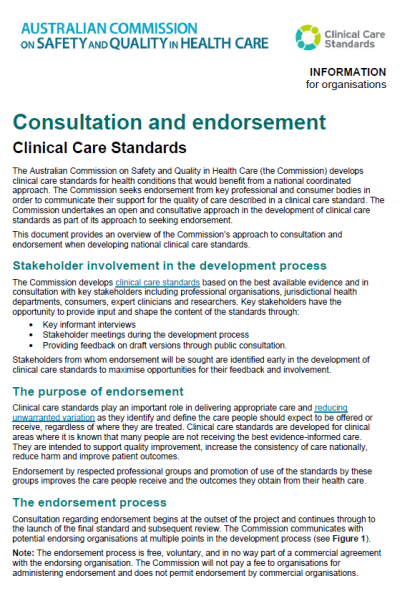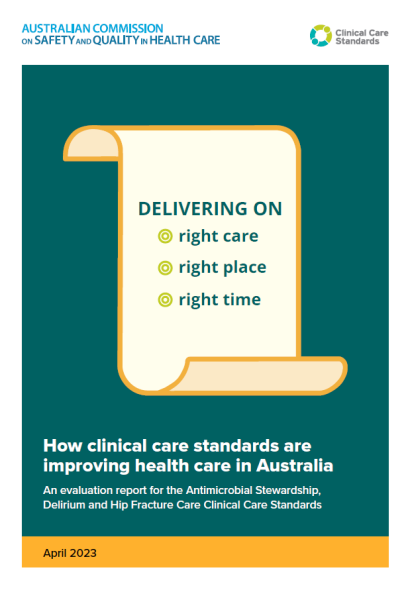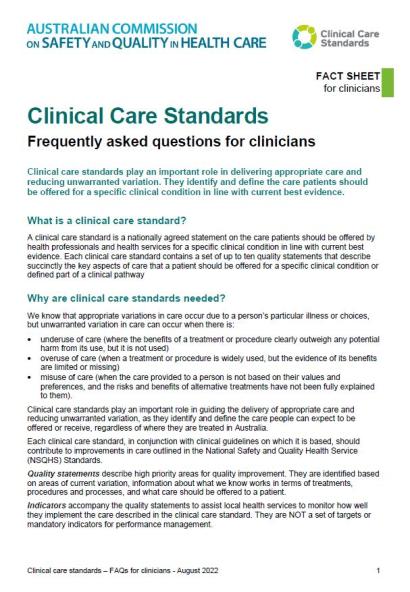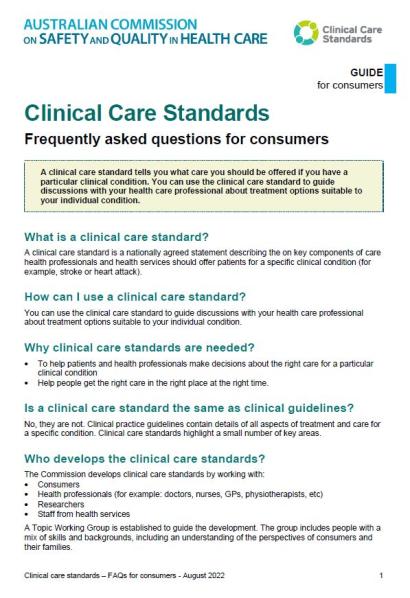About the Clinical Care Standards
Clinical Care Standards are developed by the Commission to address high priority areas for quality improvement based on evidence of unwarranted variation.
Find out about the Clinical Care Standards program and how the standards are developed and reviewed.
Introduction
A clinical care standard describes the care that patients can expect to be offered by clinicians and healthcare services for a specific clinical condition, treatment, procedure or clinical pathway, regardless of where they are treated in Australia.
Clinical care standards aim to address unwarranted variation in health care or patient outcomes by increasing evidence-based healthcare. Unlike clinical guidelines, they focus on priority aspects of care
Clinical care standards contain:
- Quality statements describing the care that a patient should be offered, regardless of where they are treated in Australia
- Information for patients, clinicians and healthcare services about what each statement means
- Indicators to help clinicians and healthcare services monitor the care described in the clinical care standard and to support local quality improvement
Each clinical care standard is supported by implementation resources for consumers, clinicians, and health services, and in some cases, for Primary Health Networks (PHNs).
Development of clinical care standards
When selecting topics for clinical care standard development, the Commission is guided by national data on current clinical practice and areas of unwarranted variation, advice from its advisory committees, and consideration of the following factors:
- Potential to reduce unwarranted variation in care
- Availability of high quality, current clinical practice guidelines, standards or evidence available for a clinical practice area
- Opportunities to take action to reduce the risk of harm and improve clinical outcomes and experiences for consumers
- Potential to measure improvements in clinical outcomes
- Priorities for the Commission and its key stakeholders.
In developing the clinical care standards, the Commission uses the most up-to-date clinical guidelines and standards, information about gaps between evidence and practice, the professional expertise of clinicians and researchers, and perspectives of consumers.
Each clinical care standard is developed by a topic working group who consider the most current evidence, have expertise and knowledge of the issues affecting the appropriate delivery of care, and issues that are important to consumers.
Stakeholder involvement
The Commission consults with stakeholders in a number of ways during the development of clinical care standards.
Evaluation
Clinical Care Standards are evaluated in accordance with key goals and objectives for the program. These are outlined in the Clinical Care Standards Program Logic for development and implementation of clinical care standards.
Evaluations focus on a standard’s:
- Relevance and feasibility to implement
- Adoption and use
- Championing by stakeholder and interest groups
- Improvements in quality of care.
An evaluation of the clinical care standards was undertaken in 2023 focusing on the Antimicrobial Stewardship, Delirium, and Hip Fracture Clinical Care Standards. This evaluation found that:
- 96% of health services surveyed reported that the clinical care standards are improving quality of care
- 92% of health services surveyed found the clinical care standards relevant.
Read the Evaluation Report to find out more about how clinical care standards are driving changes in care.
Review
Clinical care standards are periodically reviewed for currency and to reflect new evidence or changes in care, or new quality improvement priorities.
Frequently asked questions
Stay up to date
For future updates on Standards due to be launched and out for consultation, follow us on X @ACSQHC, LinkedIn or subscribe to our eNewsletters.




